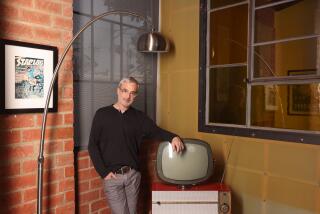Heaven Won’t Help Us : THE DISCOVERY OF HEAVEN. <i> By Harry Mulisch</i> .<i> Translated from the Dutch by Paul Vincent (Viking: $34.95, 730 pp.)</i>
- Share via
“The Discovery of Heaven” is an ebullient, cheeky, exhaustive and sometimes exhausting philosophical novel about the failure of the Creation. It is a “Paradise Lost” turned upside down and Lucifer wins. It is the largest and most ambitious work of Harry Mulisch, a Dutch author who writes in the sweeping speculative tradition of a Robert Musil or a Thomas Mann.
“Discovery” is set in two places and told on two levels: contemporary Holland and heaven in a state of contemporary dilapidation. The Earth part--some 700 pages--is a portrait of where civilization stands at the approach of the second millennium. It is drawn in the stories of two quirky, dubious and highly engaging Dutchmen--Max, an astronomer, and his bosom buddy Onno, a linguist turned politician--and of Quinten, a divine emissary born to Onno’s wife but fathered adulterously by Max.
Inserted in this genial, rich and creaky barge of a novel is its miniaturized but potent propeller: 30 pages of conversation between two high-ranking members of the heavenly hierarchy. One is a cynical bureaucrat. His subordinate, an unnamed archangel, is a prickly can-do activist charged with carrying out the Quinten project. Can-do--except that the project itself is a confession of Divine defeat, a phasing out of the experiment that began with the creation of Adam.
It seems that God’s compact with man, sealed in the giving of the law to Moses, has been deteriorating for centuries. The decline started with a 16th century deal between Lucifer and Francis Bacon. In return for the job of royal chancellor, Bacon agreed to propagate the philosophic method of inductive, as against deductive, reasoning. It was the basis of modern scientific discovery. Over the centuries it came to give humanity the power to split the atom, blast holes in the ionosphere, destroy the environment and fiddle with DNA, the building block of life itself.
God’s power, as Lucifer foresaw, was nibbled away. He can’t even send a message anymore, the archangel complains; Freud and his successors made sure that any divine command would be regarded as an inner voice. All that remains, therefore, is to close up shop, revoke the Mosaic compact and take back the tablets of the law. These, as the novel has it, are presently in the church of St. John Lateran in Rome. Quinten is sent to retrieve them.
What with all of the above, divine emissaries with flaming swords are no longer possible. The archangel, grumbling mightily, has had to arrange everything through natural means and a minimum of hopefully inconspicuous celestial nudges. His craftsmanship is not always smooth, though, and he is touchy about it. He had to drop a basketball-sized meteor to eliminate one of the characters and make a tree fall just right so as to silence another.
Such occasional poppings-out of the deus from its machina are like television commercials, though less frequent. They are a word from the sponsor among the seemingly natural doings down on Earth that make up the novel’s bulk. They give these doings an occasional zany jolt; they also allow them to go their rambling, discursive way while reminding us of the design.
The lives of Onno and Max, played out over the past 30 years, are an exploration of modern Europe. Their different roots lie in Europe’s riven history. Max’s grandfather was an Austrian who married the daughter of a German Jew living in Holland. When the Germans invaded, he joined the Occupation and had his wife deported to the death camps. Afterward, he was executed as a war criminal.
If Max comes out of European chaos, Onno comes out of European order. His family is old Dutch aristocracy; his father, a former prime minister imprisoned by the Nazis, is a conservative patriarch. Onno--fat, slovenly and an Etruscan scholar--is the family rebel, a nonstop talker and fantasist. When he and Max meet by chance (with an archangelic nudge), it is the passionate union and disunion of opposites. Max is a meticulous astronomer, a disciplined loner and coolly devastating womanizer.
Mulisch evokes the exultancy of two minds sparking and diverging--Max representing science and Onno the humanities. There is nothing abstract about either, though; both are human and flawed. The author portrays the passage of time through them and the muting wrought by age and tragedy.
Max falls in love with Ada, a quiet-mannered cellist; later, in Max’s absence, Onno and Ada become lovers and marry. The trio remains close, though, and travels to Cuba together when Ada receives an invitation to play there. Through a comic mix-up, Onno and Max find themselves entertained as the Dutch delegation to an international guerrilla meeting. Tropical allure briefly seduces them; Onno sleeps with a radical American art major who flaunts a bikini and a submachine gun. Max and Ada have a final one-night fling.
Ada becomes pregnant--it is the moment for the emissary spark from heaven--but, before she can give birth, a falling tree knocks her into a perpetual coma. When Quinten is born, Onno assumes he is his but is unprepared to raise him. Max, who has been put in charge of an astronomy project out in the countryside, volunteers. Ada’s mother, widowed on the same night that Ada is felled, will move in to help.
The plot lines are palimpsests. The moral, spiritual and intellectual disorders of modern life doodle graffiti across every scene. A violent sexual attraction joined Max and Ada’s mother on the night he came to see her after her husband’s death and her daughter’s disablement.
“He had just slept with the grandmother of his child,” Max reflects, “on the bed of her daughter--who had just been in an accident--dressed in the pajamas of her husband who had just died.”
As the years pass, Onno and Max pass gradually from the center of the book’s focus. Onno reverts to the family tradition and goes into politics with limited success. Max supervises the construction of a huge radio-telescope, but his theoretical work lags. When he does get a Nobel-sized insight into what lies beyond the Big Bang origins of the universe--it looks rather like God--a meteorite fells him.
Meanwhile, Mulisch tells of the raising of Quinten, a child of extraordinary beauty and wisdom. Much of the slow middle portion of the book is devoted to his quiet exploits and extraordinary sayings; anecdotes about somebody else’s child, no matter how divine, can drag. Even the Bible gives only a few pages to Jesus between ages zero and 33.
With Quinten grown up and enlisting the enfeebled, the book’s final part turns into an intellectual action thriller. The burglary of St. John Lateran, and the lengthy ratiocination through which the two conclude that the Mosaic tablets are there, manage to be both tense and far-fetched. A final scene in Jerusalem returns Quinten, or rather his soul, to his heavenly controllers, along with the words of the Decalogue inscribed on the tablets. The stones themselves, crumbled, are removed by the Jerusalem garbage department.
Immensely wordy, “Discovery” repeatedly redeems itself through its faith in words. It is a compendium of just about everything Mulisch knows; it is his book of the world. He bumps along over tedious stretches, silly stretches and stretches of ravishing intelligence. His people are earthy and loony, believable in their waverings and wobbly in their beliefs. His message about the retreat of heaven before the engorged advance of civilization is gloomy, yet his book is oddly blithe. At the end, the archangel stomps off from the tents that his superiors are striking. He will climb back down and have another go.
More to Read
Sign up for our Book Club newsletter
Get the latest news, events and more from the Los Angeles Times Book Club, and help us get L.A. reading and talking.
You may occasionally receive promotional content from the Los Angeles Times.









